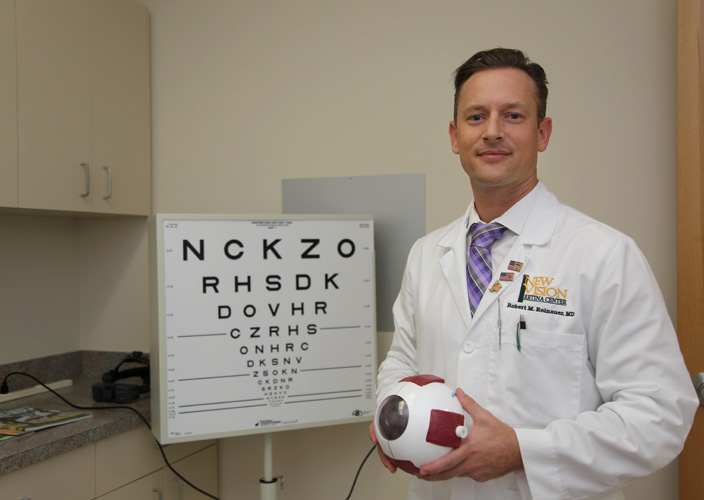
Four words no one wants to hear from their eye doctor are: “You have macular degeneration.”
Why?
Because macular degeneration is the leading cause of vision loss in adults age 60 and older worldwide and, according to the National Eye Institute, “an estimated 15 million Americans have some form of age-related macular degeneration or AMD.”
AMD comes in – or can evolve into – two separate variations: dry AMD and wet AMD. As the Mayo Clinic points out, dry macular degeneration is much more common and less severe than wet macular degeneration, but Mayo also warns that the wet type always begins as the dry type.
So, the earlier any form of AMD can be detected and treated, the better the chance of keeping at least some of your vision.
Dr. Robert (Rob) Reinauer, a fellowship-trained surgical and medical retina expert at Vero’s New Vision Eye Center, is keenly aware that prompt detection and treatment of AMD is essential and he wholeheartedly agrees with the American Society of Retina Specialists when it says “although there is no cure for this disease, early detection and proper care can ensure good vision for years to come.”
If AMD is left untreated, on the other hand, you will lose your sight.
And, as the population ages, the rates of AMD are set to soar.
The Bright Focus Foundation says the current figure of 15 million mentioned above will climb to nearly 22 million in the U.S. by 2050. Worldwide, the numbers are worse: 196 million cases are projected globally by 2020 and that number will likely climb to 288 million cases by 2040.
“One of the most challenging things,” says Reinauer, “is that when we have a [dry] macular degeneration patient, we follow them closely and we try to reduce the chance of it converting to wet macular degeneration, because with wet macular degeneration, you’ll lose vision much more quickly. When you have bleeding in the back of the eye, that’s what wet macular degeneration is.”
There is, however, at least some good news on AMD in the form of “anti-VEGF” or anti-vascular endothelial growth factor drugs – including one newly approved drug that New Vision helped test.
As Reinauer explains, “the blood vessels from wet macular degeneration are new blood vessels. They require the VEGF molecule to grow. But these new blood vessels are not strong. They’re not like the ones that we were born with [and haven’t] had time to really develop and so they break down and they bleed more easily and that’s what creates the swelling in the back of the eye [in wet AMD].”
Anti-VEGF drugs prevent those vessels from growing and then bursting and, in the process, can help preserve your vision longer.
“Unfortunately, I cannot say there’s a cure,” Reinauer admits. “There is no cure at this time. But what I can say is ‘Look, I know this isn’t a cure, but 90 percent of people who get these injections will maintain their vision longer.’”
Two of these anti-VEGF drugs are Regeneron’s “Eylea” and Roche Pharmaceutical’s “Lucentis.” According to ongoing studies, they have helped preserve vision for at least seven years and possibly longer.
In October, the U.S. Food and Drug Administration – with a little help from New Vision’s in-house research center – approved another drug: Novartis’ “Beovu.” New Vision was the only facility in Indian River County to participate in the FDA’s clinical trials for Beovu.
Reinauer is hopeful the new drug will help patients. “What I foresee,” he says, “is for a patient who doesn’t respond to one of the other medications – we’ve seen that with Eylea” – the next step might be switching to Beovu. But even with the approval of Beovu, which gives doctors another weapon in their battle with MDA, fighting the disease is still a tough row to hoe for patients.
Typically it means getting monthly injections of one of the above drugs along with monthly monitoring of the disease.
Medicare, according to Reinauer, will cover these injections and New Vision’s in-house insurance team will check private insurance companies to see if you are covered under their policies.
Dr. Robert Reinauer is a fellowship-trained surgical and medical retina expert with New Vision Eye Center at 1055 37th Place in Vero Beach. The phone number is 772-257-8700.



